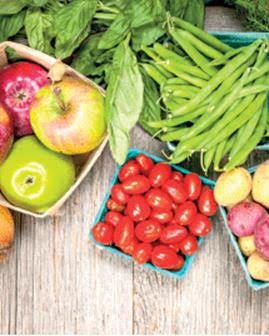In Sunday Leader
Organic Foods The Way To Go
By Dr Harold Gunatillake
Health Writer
We all know that conventional farmers cannot grow agricultural plants on mass scale without using pesticides and other chemical sprays at intervals until harvested, to prevent pests from destroying the yield and attacking the leaves. You are well aware that wheat growers use pesticides on beds even before seeds are sewn on them.
Pre-harvest application of the herbicides containing deadly active ingredient glyphosate is sprayed as a desiccant (drying agent) 7-10 days before harvest within the conventional farming community.
According to Dr. Stephanie Seneff of MIT who presented a paper on the subject at a nutritional Conference in Indianapolis, desiccating non-organic wheat crops with glyphosate just before harvest came into vogue late in the 1990’s with the result that most of the non-organic wheat in the United States is now contaminated with it. Seneff explains that when you expose wheat to a toxic chemical like glyphosate, it actually releases more seeds resulting in a slightly greater yield: “It ‘goes to seed’ as it dies. At its last gasp, it releases the seed,” says Dr. Seneff. (Ref: Healthy Home Economist)
Today, most organic farmers are aware of techniques of growing food products without using pesticides.
Organic farmers grow and produce food without using synthetic chemicals. They do not use genetically modified components either, or allow foods to be irradiated. The term organic can also cover animal products, such as organic eggs obtained from free range than caged hens.
In Australia fruits and vegetable dried legumes, grains, meat and meat products, dairy foods, and some processed foods are available in organic form; but it is still not sufficient for the consumption of the total population. The organic food industry in Australia is booming currently and is worth $ 200-4259 million per year domestically and a further $50-$80 million per year in exports. Like organic plants, animals are raised using organic methods, treating them humanely and with respect.
For example, cows are not kept infeed lots, and chicken are let free. Animals are not fed with any growth hormones, steroids, hormones or antibiotics. They are treated with vaccine inoculations to prevent disease.
The USA and Canada are having rapidly growing food markets of 20% and Europe about 7.8% per year.
Organic farming protects the environment, working in harmony with the ecosystems, including conserving water, soil and energy.
People in more affluent countries now are more aware of the importance of consuming organic foods, and the consumer demand is growing at the rate of 20-30 percent per year.
When will the Sri Lankans in Sri Lanka be aware of the necessity to consume organic foods for health reasons? There is no governmental working to reveal the importance of consuming organic foods propagated by the health authorities. People still eat pesticide contaminated white foods cooked from wheat and rice flour. The farmers in the Northern parts of Sri Lanka are dying of an unknown kidney disease, due to chemical contaminations from the water and the pesticides used in paddy cultivations. The harvested rice is distributed to the rest of the island and sold in super-markets and small grocery boutiques. The incidence of chronic diseases, including diabetes, obesity, heart disease, and chronic kidney disease are rampart, for obvious causes. Nevertheless, super-markets are crowded to purchase these foods that are being produced through the use of herbicidal and pesticide environments.There is no emphasis to consume organic foods, and the demand is insufficient to grow food products organically. Further, the average person would not be able to afford to purchase the more expensive organic foods.
Sri Lanka has pioneered to grow organic foods in certain product ranges, such as organically certified tea, and non-traditional agricultural products such as spices, essential oils, herbs, desiccated coconut, cashew, vegetables, and so on. They are being produced by small scale farmers in the provinces.
In Sri Lanka, organic fertilisers like animal manure such as cattle and poultry manure are being successfully used for sufficient vegetable yield, especially in the production of vegetables and potatoes.
Organic farming is used in growing in home garden crops such as mango, banana, avocado and durian, etc. Most spices such as cardamom, nut meg, clove, pepper, and cinnamon are organically grown.
It is unfortunate that the staple food ‘rice’ cannot be grown organically in the island without using chemicals in the form of herbicides and pesticides.
Organic foods are not necessarily devoid of chemicals. They may be grown in land previously not used to cultivate organic food. Such soil may be contaminated with pesticides from previous cultivations. It is observed that the pesticides in such foods are much less than found in those foods grown with synthetic chemicals.
The vitamin content of foods grown in chemical free soils or conventionally grown plants doesn’t seem to differ very much. Some organic foods have lower nitrate levels, higher vitamin C levels, and higher levels of selenium and antioxidants.
People are less allergic to organically produced foods, and sometimes, the allergies may disappear totally as a cure for certain specific allergies.
Organic farming brings in ecological harmony and environmental sustainability, unlike conventional farming which harms the ecology and the environment. For example, if a golf course is built close to a river or creek, the fish and the other sea life will be destroyed.
Organic crops must be grown in safe soil, have no modifications and remain separate from conventional farming, using synthetic pesticides, bioengineered genes (GMOs), petroleum based fertilisers, and sewerage sludge-based fertilizers.
It is reasonable for all of us to go organic to survive in a chemical free environment..









No Comments